Let them come to Berlin
Berlin -- 1920s Paris, 1970s New York, 1990s Berlin. Is it always clear to people that they're living through a golden age?
For me at least, when I first arrived in the German capital a quarter century ago, I worried I'd already missed the party. Little did I know the band was just warming up.
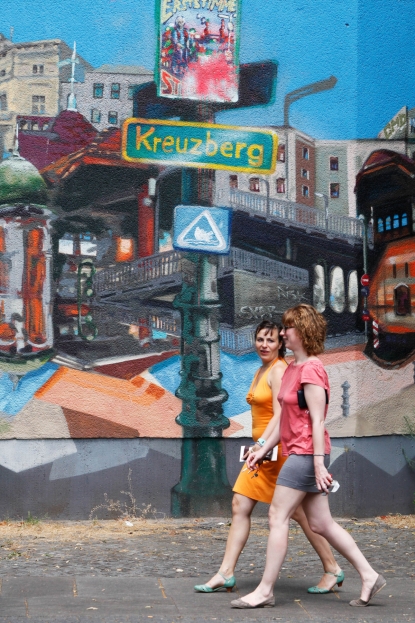 Two women walk past a building with a street scene painted on the wall in Berlin's Kreuzberg district on July 5, 2010. (AFP / David Gannon)
Two women walk past a building with a street scene painted on the wall in Berlin's Kreuzberg district on July 5, 2010. (AFP / David Gannon)The Berlin Wall had tumbled down under the weight of a peaceful people's revolution five years before -- a semi-eternity to someone just out of university.
Lucky for me, most news organisations had made the same assumption.
After flooding the city with enough manpower to catch the "end of history" in 1989, by the mid-1990s most had drawn down their star reporters and the circus had moved on.
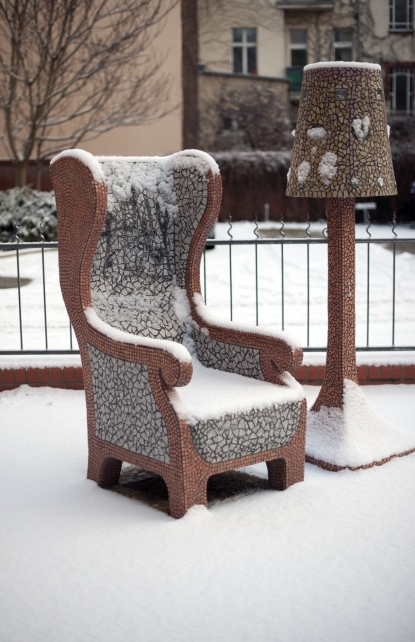 Snow-covered street art pieces made of concrete and ceramics are seen on a pedestrian way on February 3, 2012 in the Berlin's Pankow district. (AFP / Barbara Sax)
Snow-covered street art pieces made of concrete and ceramics are seen on a pedestrian way on February 3, 2012 in the Berlin's Pankow district. (AFP / Barbara Sax)Enter a very green, very eager young American reporter who had studied a bit of German and mainly thought: Berlin's cheap, different and I have nothing to lose. It was the hour of the rookies.
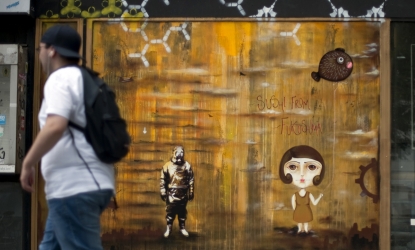 A man walks past a graffito titled Sushi from Fukushima on a building in Berlin's Wedding district on August 16, 2012. (AFP / Barbara Sax)
A man walks past a graffito titled Sushi from Fukushima on a building in Berlin's Wedding district on August 16, 2012. (AFP / Barbara Sax)The day I got to Berlin, about a year after my first visit, it was pouring rain and I had boarded the wrong cross-country train after landing at Frankfurt airport on a cheap transatlantic flight.
We finally pulled into Zoo station and my future roommate Freddy remembers her first sight of me tiptoeing around the junkies in the notorious arrivals hall and dragging an Apple Macintosh computer -- not a laptop, but a full-sized desktop Classic -- that I had stuffed in a gym bag.
The plan was to stay a year, and the reunited city's delicious affordability felt like freedom on a platter given the mountain of college debt waiting for me back home.
But without an apartment, a residence permit or a job, it was still going to take a bit of luck and ingenuity.
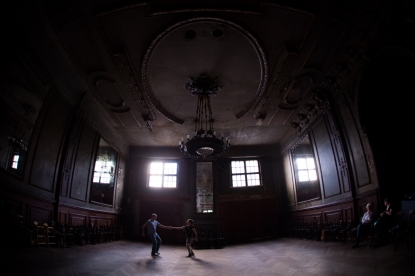 People dance during a lesson in the Spiegelsaal (hall of mirrors) at Claerchens Ballhaus on July 10, 2013 in Berlin. (AFP / Johannes Eisele)
People dance during a lesson in the Spiegelsaal (hall of mirrors) at Claerchens Ballhaus on July 10, 2013 in Berlin. (AFP / Johannes Eisele)My college friend Susanne had rented me her room in the then shabby-chic eastern district of Prenzlauer Berg for six weeks until I found my feet. It cost -- wait for it -- $100 a month.
It was a vast and old-world elegant apartment compared to my student housing back in the States -- high ceilings with elaborate mouldings, panel doors and buffed hardwood floors.
Like the layers of old wallpaper in the hallway, my temporary home conjured up all the chapters of German history that had unfolded in this never-finished city. A perfect place to start writing.
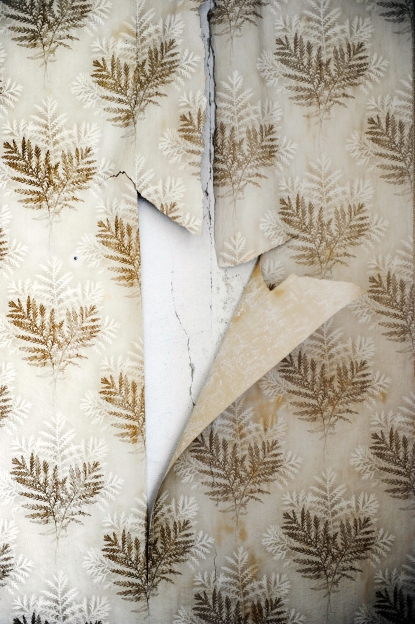 The wallpaper peels off the wall in one of the interrogation rooms in the former prison of the East German, communist-era secret police, known as the Stasi, at Hohenschoenhausen in Berlin, August 12, 2010. (AFP / Odd Andersen)
The wallpaper peels off the wall in one of the interrogation rooms in the former prison of the East German, communist-era secret police, known as the Stasi, at Hohenschoenhausen in Berlin, August 12, 2010. (AFP / Odd Andersen)But like many flats in east Berlin even a few years after reunification it had no phone line and winter was coming.
Thank heavens for Andreas, whom I'd met backpacking the previous summer in Barcelona and who's remained a great friend. A kind-hearted violin maker, he lived in west Berlin with his own phone number which he agreed to lend me.
So once a day, I'd queue up at a pay phone in front of the Colosseum cinema on the Schoenhauser Allee, staring at its hand-painted movie posters and doing a little dance to keep warm until it was my turn.
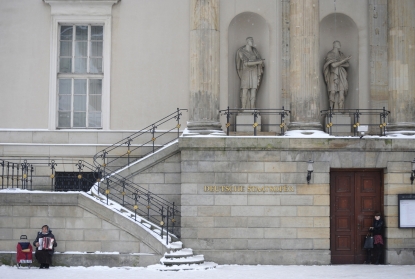 A woman speaks on her mobile phone as a street musician plays an accordion in the snow in front of the Deutsche Staatsoper (German Opera) building in Berlin on January 6, 2010. (AFP / John Macdougall)
A woman speaks on her mobile phone as a street musician plays an accordion in the snow in front of the Deutsche Staatsoper (German Opera) building in Berlin on January 6, 2010. (AFP / John Macdougall)Feeling like a character in a spy thriller, I'd ring Andreas at the appointed time and he'd relay all the messages his answer-phone had recorded for me in the previous 24 hours.
Work leads, tips on a flat, the occasional hello from a guy I'd met in a bar the night before -- Andreas was my indispensable link to the modern world, a situation even my grandmother found hilariously retro when I wrote to her back in Vermont. Not to mention our flat's coal ovens...
After many fits and starts, my first story for a big British media company ended up being about telephone service finally coming to east Berlin. Write what you know, as they say.
After that I was off and running. What was going to be a year turned into, well, a lot longer. And when the new millennium began, just as the German government was setting up again in the once and future capital, I joined AFP.
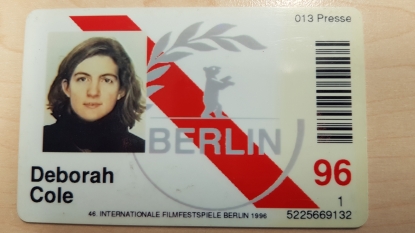 One of the author's earliest press accreditation badges. (Photo courtesy of Deborah Cole)
One of the author's earliest press accreditation badges. (Photo courtesy of Deborah Cole)But first: Susanne returned to claim her room and I still hadn't found a new place to live. So she and our roommate Freddy generously put me, the budding foreign correspondent, up on the last bed they had available: an inflatable banana-shaped air mattress.
If all this sounds less than Josephine Baker-era Paris glamorous, less raw than Patti Smith’s New York, it had a magic of its own.
The east of the city in those days felt like a playground and a blank canvas, its sooty buildings scarred with bullet holes -- never restored under communism -- and abandoned industrial spaces left fertile ground for people with ideas. People who felt like they had been handed a rare, precious shot at a fresh start in history.
One of the first things I remember about walking around the cobblestone streets back then was the stillness, the sense that for several minutes you were absolutely alone in the city. It sometimes was so eerie that I wondered if I was being watched behind rustling curtains.
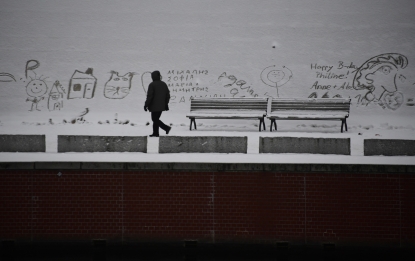 A person passes murals drawn in snow at River Spree in Berlin's Mitte district on January 9, 2017. (AFP / Tobias Schwarz)
A person passes murals drawn in snow at River Spree in Berlin's Mitte district on January 9, 2017. (AFP / Tobias Schwarz)That first autumn the days seemed to get so short so fast that the only comfort was the bacchanalian nightlife.
The Tuesday Bar, the Thursday Bar -- named because somebody on a weeknight decided to set up 10 wooden crates in an empty space as tables, cram candles into used wine bottles and hope the whole place wouldn't go up flames when the drunken revelry started.
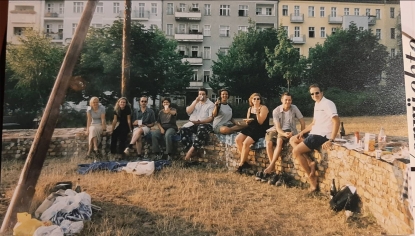 The bacchanalian daylife -- the author (second from left) and friends take a break from living history. (Photo courtesy of Deborah Cole)
The bacchanalian daylife -- the author (second from left) and friends take a break from living history. (Photo courtesy of Deborah Cole)The old power stations and factories -- even the vault of a pre-war department store -- became spaces for thousands of people to dance alone to jarring, entrancing sounds. Gorgeous old crumbling buildings transformed into "Wohnprojekte" (housing experiments) where decidedly bourgie squatters -- future architects, photographers and journalists -- carved out their slice of the new Berlin. A couple of them, including one co-founded by my future husband, are still thriving.
But the rest of the neighbourhood? Expensive condos, chain stores and shared workspaces. Wartime mortar damage on building facades now plastered over and painted in pastels. And in a city where people used to talk about everything but what they paid in rent, real estate prices and availability are a real source of stress, particularly for newcomers.
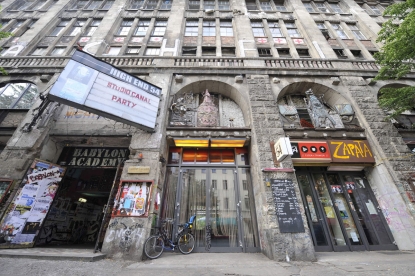 View of one of Berlin's most famous artist colonies, the Tacheles, taken on July 15, 2008. (AFP / John Macdougall)
View of one of Berlin's most famous artist colonies, the Tacheles, taken on July 15, 2008. (AFP / John Macdougall)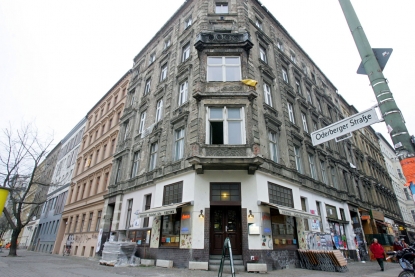 A run down building stands at a corner in Berlin's trendy Prenzlauer Berg district 12 January 2005. (AFP / John Macdougall)
A run down building stands at a corner in Berlin's trendy Prenzlauer Berg district 12 January 2005. (AFP / John Macdougall)
But just a few weeks ago, as Germany started gearing up for the 30th anniversary of the Wall's ecstatic fall, I sensed a bit of the old Berlin at the opening of friends' photo exhibition at a building that has stood empty for a decade.
The Haus der Statistik (Statistics House), a pre-fab high rise that opened in 1970 for the communist state's number crunchers near the Alexanderplatz crossroads, had been rebranded Alles Anders Platz (Everything Different Square). Five years ago, a citizens' initiative saved the building from demolition and its future use is still up for grabs.
Bottled beer and Ikea wine glasses in hand, old friends and familiar faces from back in the day mingled on the ground floor, talking of happy memories, well-spent youth and future plans.
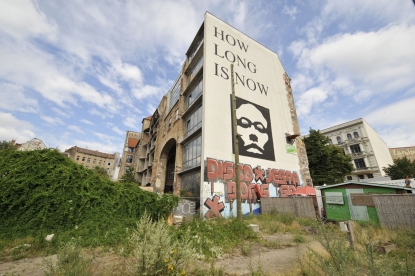 View of one of Berlin's most famous artist colonies, the Tacheles, taken on July 15, 2008. (AFP / John Macdougall)
View of one of Berlin's most famous artist colonies, the Tacheles, taken on July 15, 2008. (AFP / John Macdougall)A few weeks later, things seemed to come full circle, as young activists from the Extinction Rebellion group set up in the building for training before staging several days of disruptive climate protests in the city centre. They're fighting for their own vision of the city, far from the coal, diesel and steel it was built on.
As Berlin's hype grew and peaked, people have often asked: wasn't it all so much better back then? Isn't that Berlin lost forever in a tsunami of late capitalism, real estate speculation and polarised politics?
The questions, for me at least, are so intertwined with my own life that you could just as easily ask: wouldn't you like to still be in your early 20s?
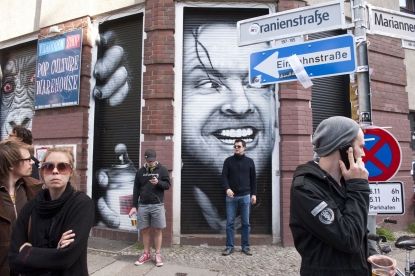 Revelers hang out in front of a closed store featuring a portrait of US actor Jack Nicholson in the film The Shining by French graffiti artist MTO during a May Day street festival in Berlin's Kreuzberg district May 1, 2011. (AFP / John Macdougall)
Revelers hang out in front of a closed store featuring a portrait of US actor Jack Nicholson in the film The Shining by French graffiti artist MTO during a May Day street festival in Berlin's Kreuzberg district May 1, 2011. (AFP / John Macdougall)The answer? Yes and no. Don't get me wrong, I was privileged to be right in the heart of a moment that became an era, a shared dream that lasted longer than most. But Berlin back then was also a provincial place. A bit closed-minded for all its idealism. And not infrequently rather surly.
Berlin, now, feels slightly less special because it's no longer so insular -- it's more open to outsiders like that younger version of me.
One night I can grab a craft beer with American friends who have fallen as hard for the city as I did and the next sip a Radeberger with my German pals at our local -- which looks like an East Berlin time capsule -- and not feel forced to make too many hard choices.
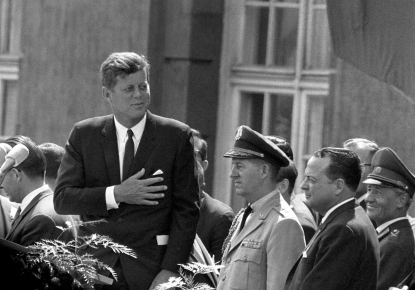 Picture taken on June 26, 1963 shows then US President John F Kennedy (L) giving a speech at the Schoeneberg city hall in Berlin, where he said his famous German sentence Ich bin ein Berliner (I am a Berliner) to underline the support of the United States for West Germany and his empathy for people living in the divided city of Berlin. (AFP / Dpa)
Picture taken on June 26, 1963 shows then US President John F Kennedy (L) giving a speech at the Schoeneberg city hall in Berlin, where he said his famous German sentence Ich bin ein Berliner (I am a Berliner) to underline the support of the United States for West Germany and his empathy for people living in the divided city of Berlin. (AFP / Dpa)John F. Kennedy's "Ich bin ein Berliner" speech in 1963 carries the less familiar refrain "Lasst sie nach Berlin kommen" ("Let them come to Berlin"), aimed at apologists he thought were going soft on communism.
Then he launched into the stirring love letter for the embattled west of the city, still living in freedom, and the line starts to sound like an embossed invitation: "I know of no town, no city, that has been besieged for 18 years that still lives with the vitality and the force, and the hope, and the determination of the city of West Berlin."
All that weight of history would lift two decades later to make me feel –- then and now —- that I had somehow, miraculously and haplessly, ended up in the right place at the right time.
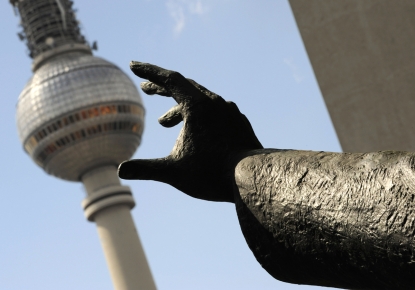 The hand of a bronze sculpture seems to catch at Berlin's landmark the TV tower, seen on June 6, 2008. The statue of a construction worker was made in 1968 by German sculptor Gerhard Thieme. (AFP / Barbara Sax)
The hand of a bronze sculpture seems to catch at Berlin's landmark the TV tower, seen on June 6, 2008. The statue of a construction worker was made in 1968 by German sculptor Gerhard Thieme. (AFP / Barbara Sax)When young American journalists ask for advice about getting set up here, I'm aware they will have it both much harder than me, and far easier.
The German government finally started offering visas for freelance reporters so you don't have to get a company to vouch for you in perpetuity.
When I smell a hint of coal heating in the autumn -- it's grown much rarer in the city -- I say a little prayer of thanks I will never again have to schlep briquettes upstairs to my flat and lug the burnt ashes back down.
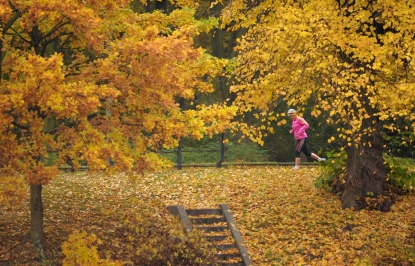 A woman jogs in the Tiergarten park on October 31, 2011 in Berlin. (AFP / Johannes Eisele)
A woman jogs in the Tiergarten park on October 31, 2011 in Berlin. (AFP / Johannes Eisele)Most Germans speak Scandinavian-good English now, so while it's far easier to get around, it will be much tougher to find a local who will let you practice your new language skills.
Cheap mobiles mean that while no one will have to wait around for ages to use a pay phone, they will also miss out on some amazing people-watching and the occasional enlightening chat with a stranger.
And while rents have soared this last quarter century, Airbnb and couch-surfing apps mean that they will probably never, ever have the singular chance to sleep on a blow-up banana.
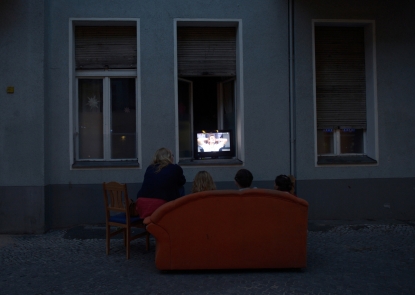 Supporters of the German national football team sit on a sofa and watch Germany's opening match in the UEFA Euro 2012 against Portugal in the district of Neukoelln in Berlin on June 9, 2012. Germany won the match 1-0. (AFP / Johannes Eisele)
Supporters of the German national football team sit on a sofa and watch Germany's opening match in the UEFA Euro 2012 against Portugal in the district of Neukoelln in Berlin on June 9, 2012. Germany won the match 1-0. (AFP / Johannes Eisele)




